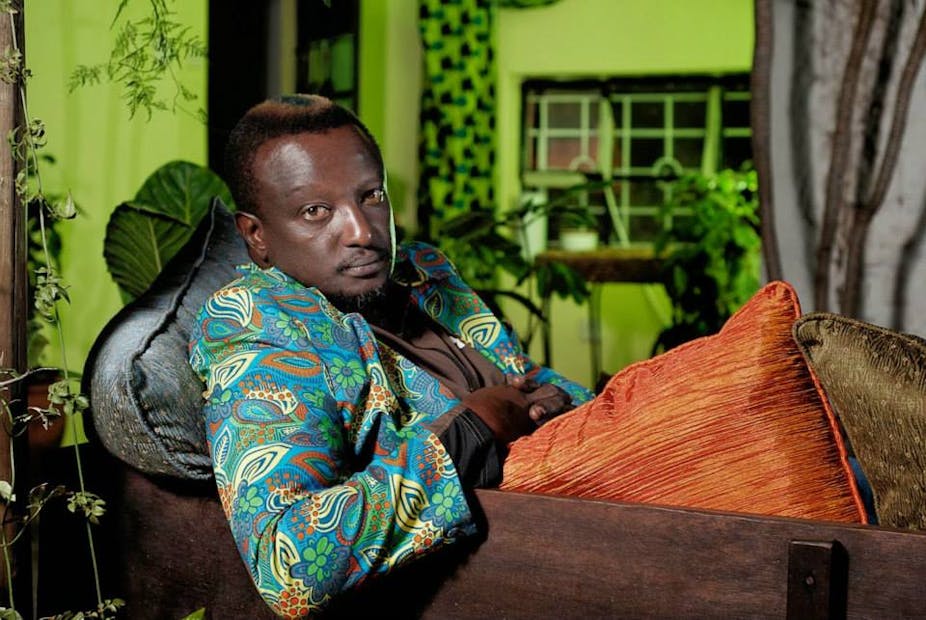Binyavanga Wainaina, one of Kenya’s most famous writers, has passed away.
How to write an obituary for a person of such standing? The conventional way would be by starting with the key biographical facts.
Wainaina was born in 1971 in Nakuru, Kenya. He went to school in Nakuru, Thika, and Nairobi. He studied a degree in Commerce in South Africa (University of Transkei) and later an MPhil in Creative Writing in the UK (University of East Anglia).
In 2002 he won the Caine Prize for African writing, with his short story “Discovering Home”. In 2003 he became the founding editor of African literary magazine, Kwani?, and he served as the director of the Chinua Achebe Centre for African Literature and Languages at the Bard College in the US.
In 2007 he was awarded the title “Young Global Leader” by the World Economic Forum which he declined because he preferred the freedom as a writer
loose, independent and creative,
over the pressure to
significantly impact world affairs.
In 2011 he authored his acclaimed debut book, “One Day I Will Write About This Place”.
He came out as gay in 2014, at a time when African countries like Uganda and Nigeria were passing new anti-homosexuality bills. In the midst of virulent social and political homophobia, he published an intimate, autobiographical literary story, “I am a Homosexual, Mum”.
On World Aids Day 2016 he announced on Twitter that he was HIV positive “but happy”. He suffered from several strokes. Every time he fought hard to recover, remained optimistic. He even signed contracts for two new books and in 2018 announced, on Facebook, that he was in love and getting married to his Nigerian partner in South Africa. Unfortunately, the last stroke was fatal.
But this short summary of Wainaina’s life from birth to death, doesn’t do him justice. It gives us a glimpse, but doesn’t capture the spirit of his life.
Larger than life
In his perhaps most famous satirical essay, “How to write about Africa”, Wainaina suggested that:
African characters should be colourful, exotic, larger than life – but empty inside, with no dialogue, no conflicts or resolutions in their stories, no depth or quirks to confuse the cause.
He was such an “African character”: colourful, exotic, larger than life. With his African print blazers (in the brightest colours one can think of), his spiky hair dyed a different colour every time. Colourful and exotic. With the constant flood of words in which he energetically talked speculative ideas, supported by wild bodily gestures. Larger than life.
But he was far from empty inside.
He was a brilliant writer and sharp thinker, creative and unruly. He left us a memoir, pieces of creative writing, novels in progress, essays, both written and video-performed. An incredibly rich archive of ideas and thoughts. He was a character, deep and complex. He was confusing and quirky, humorous and sarcastic, a lover of life, of food, and of whisky, frequently also ranting and raving, angry and upset.
Politics of truth
Wainaina embodied a politics of truth, in many aspects of his life. As a self-declared pan-Africanist and Afropolitan, he was committed to reclaiming African cultures and traditions to free the continent from colonial and neo-colonial social, political, and religious forces.
He was one of the most prominent and vocal African critics, not only of homophobia in Africa, but also of the religious forces that incite and fuel it. In interviews and through social media, Wainaina publicly criticised popular forms of Christianity in Kenya and in Africa more widely. In particular he targeted Pentecostalism, which he claimed was a major factor in the spread of homophobia across the continent.
He also sought to boldly re-imagine African futures. In his 2014 TED talk “Conversations with Baba”, for instance, he reclaimed the continent as:
the moral reservoir of human diversity, human aid, human dignity.
In his 2014 “We Must Free Our Imaginations” video essays, he stated: “I’m a pan-Africanist. I want to see this continent changed”, adding in reference to being gay:
I’m an African, I was brought up here, my home is here. Being an Afropolitan, I am here to stay.
How to write an obituary for a person like Binyavanga Wainaina? By concluding that he may have died, but is here to stay. In the tradition of the indigenous spirituality he rediscovered in recent years, we may refer to him as a “living dead”, an ancestor, who remains a member of the family and community, who continues to inspire us with their presence in the spirit.

